By Jennifer Harrell
When the average person thinks about infant reflux, or GERD, they often equate it to spit-up – not a big deal, something “all babies do”. Speaking as the parent of a child with severe reflux, I can say that it really is a big deal. It is an emotionally draining misadventure full of heartache, stress and frustration. As my husband and I say, our entry into parenthood was a Trial by Fire!
Our son, Sam, was born in the summer of 2010. He was a full term, healthy little boy. We fought some jaundice the first week while we learned the ropes of breastfeeding, but other than that he was a healthy little baby. Within a couple weeks, we noticed that he spit up more than was normal. He also cried a great deal in the evenings – the “witching hour”, as the old wives tales explained. This did not seem that unusual overall, as some children are simply more high needs and I was prepared for that possibility.
However, within weeks the evening tears became a full day event. Our sweet boy cried nearly every moment he was awake. He would double up in agony and scream until he could not scream anymore. No amount of feeding, patting, walking, swaddling, or comforting seemed to offer any real help. The poor boy was losing half of every meal, which was heart wrenching to see. I would nurse him for 45 minutes solid, then he’d lose half of it and be hungry again within an hour. You would stand up after feeding him and hear a huge splat behind you, as the little man lost it all over the couch, the floor, me, or whatever was in projectile range. This would startle him and he would be hungry again shortly. We were nursing nearly around the clock. There were no single 3-4 hour sleeping spells that the books said a baby would take at this age, once or twice a day. Indeed, we fed for 45 minutes every 2 hours, counting the 2 hours from the start of the feed.
It was clear something in his tummy was bothering him. The doctors called it colic and were not overly concerned, since he was maintaining and growing right on the curve. The next step would have been to go to a pediatric gastroenterologist and get an endoscopy, but we decided that the risks involved in that procedure were too great. Sam was still remaining on the growth charts, hitting his milestones on time, and so forth. The doctor was not overly worried, since our boy was doing what he should on all the measures.
During this time, we tried everything we could find to help. I wore Sam in a Moby Wrap as much as possible, keeping him upright and close. Out of everything we tried, that seemed to be the biggest help for him. We did baby massage several times a day, which he did enjoy if nothing else. We sought and tried natural remedies. We made up silly songs to dance with him and try to distract him. He slept at an incline or up on someone’s chest. His father walked miles around our house, holding and patting the baby’s back, trying to soothe away Sam’s tears. We tried to never lay him flat except for diaper changes. We burped frequently and checked his nursing latch often. I eliminated triggers from my diet, hoping that would help some.
We tried generic Ranitidine, which did not help. We learned rapidly that the peppermint flavor would make him gag to the extent of puking. To this day, he still hates mint-flavored things. We had the pharmacy flavor it with grape, but apparently grape-peppermint was no less gag worthy. I got maybe 1/4 of his Ranitidine doses into him.
The doctor was hesitant to offer a different class of reflux med (proton pump inhibitors) because of Sam’s age. As our son was growing, the doctors just did not see the seriousness of the issue. We even had a video of it that we played on our phones for them, but the doctors firmly believed it was just “average” reflux with colic and that it would get better in time and with Zantac. After all, he was growing properly and hitting his milestones, but I believe that was simply due to our hard work at home and the constant nursing. We were replacing as much as we could, given what he would lose each day. We continued home therapies and whatever Ranitidine we could get into him, as well as dealing with the side effects of the medication. The constipation caused by the Ranitidine caused our boy as much pain sometimes as the reflux it was supposed to be treating.
We also dealt with the difficult issue of maternal milk oversupply. There was a great deal of demand, with all the vomiting, so supply definitely kept up. However, it also meant that we fought a hind milk/foremilk imbalance, which is often called oversupply. I wanted to throttle every single person that said “better too much than too little”, because that is not true at all. Breastfeeding oversupply has its own set of painful issues for both baby and Mother. Getting it under control is hard work and a big reason for the cessation of breastfeeding. Most people, including many lactation consultants and OB/GYNs, know nothing about oversupply issues. I am very thankful to have had a friend with an oversupply problem, who noticed my posts on Facebook and figured out what was wrong. Before her, I had never heard of oversupply, nor had my family or my doctors. After her tip, I researched and worked to get it under control, which removed that problem from the equation of Sam’s tummy trouble. This was an important issue for us to have found and subsequently addressed. In fact, we discovered when talking about it that we had a family history of this problem, and it had led to women in my family ceasing breastfeeding in the past. Oversupply was not something talked about 20-30 years ago either; it was lost knowledge. I am thankful that I learned what it was in time and extra thankful for the Internet, which taught me how to fix it. Sam was still able to get the best food possible for him, tailored to his needs, for 3 years of his life because we found and resolved that issue.
In between attacks, his little personality would shine through. He was a happy, giggly boy with a great curiosity about his world. Even in the midst of a bad night, we could often still coax a smile out of him for a moment. It was so difficult to know that he was in pain and, when it started up, there was nothing we could do to stop it. That’s the worst frustration, being unable to tell exactly what is wrong and still more frustrating not to be able to just fix it.
There were many days in the first 6 months that my husband would tell us good night and then get up 8 hours later to find that I still had not been to bed. The poor baby could not sleep due to the pain. Mama could not sleep because of the poor baby. Daddy had to sleep (or try to, anyway!), as he was our sole income. Daddy was greatly upset and frustrated that he couldn’t fix this for both of us. We both sought desperately to make this better for our boy. All we wanted, as parents, was to see our baby comfortable and happy. Thankfully he was still growing as he should and we were getting by, but there is no doubt that it was rough for all of us.
At 7 months, we introduced some solids gently into Sam’s diet. The signs of food readiness were not fully present until that time (no tongue thrust, sitting up unaided, etc.). We avoided grains that might worsen constipation and stuck with things like avocado. Little Sam loved his avocados! He still nursed before each meal, but he enjoyed playing with food as well. While the introduction of solids did not make matters worse, it did not help either. We lumbered along, with the hope that he would outgrow this stage. At this age, it wasn’t misery every day for him, but he would still frequently vomit up large portions of his meals or be in discomfort for a while after eating.
By about 10 months, Sam was vomiting a less frequently. We hoped that this meant he had grown out of it, so we tapered off the Ranitidine with doctor approval. The side effects of the Ranitidine disappeared and the reflux appeared to get no worse, so we were hoping this was the beginning of the end. Sam was still an avid nurser, but now on a less frequent schedule than the first 6 months. He also adored food.
We used the baby led weaning approach to feeding, with some organic purees mixed in here and there. We kept those little packets in every handbag, in the car, and at Grandma’s. They were wonderful for a quick snack. His tummy seemed to do better if we made sure he nursed and/or ate frequently. An empty tummy meant bad news for everyone. Sam adored playing with his food, tasting the new tastes, and could knock out a packet in no time flat! It was nice to see, even if his food adventures were accompanied by gag related vomiting several times a week. This alarmed him, but we’d help him rinse his mouth and he’d be ready to play again. Some of the vomiting appeared related to the texture of foods, an issue we still struggle with today, but some of it was delayed and seemed tied to reflux rearing its ugly head.
Around 15 months, our progress halted. The reflux came back with a vengeance. He was puking 1-2x a day. We started back on Ranitidine, with limited success. I also started to notice spots on Sam’s teeth. He was early to get teeth and he had 7 teeth by 7 months. He had a full head of teeth by 18 months. The spots on his front teeth concerned me, but our adult dentist said that they don’t recommend children come in until age 3-4. Our doctor said that it didn’t look like anything and echoed the age recommendation of 3-4 years old. By 18 months, I was increasingly concerned about that spot. After a Google search, I discovered that the American Academy of Pediatric Dentists recommend children see the dentist by one year! We made Sam an appointment.
At Sam’s appointment, the news was not good. The reflux had created havoc on his teeth. He had the teeth of a bulimic. The backs of his front teeth were badly decayed. In spite of all we did from the day his first tooth poked in at 3 months: twice daily brushing, he NEVER went to bed with a bottle (in fact, he never took bottles!), cleaned his mouth after nursing, we did not allow sugary foods, etc. The damage was extensive. He would need the work done under anesthesia at the hospital, as it was the only way to do a proper, safe, quality job on a child so young and the only kind way to accomplish it on a small child. With anesthesia, he would also not end up harboring any fear of the dentist, which would be important in the years to come.
We booked the surgery center for the month after his 2nd birthday and commenced a stringent dental program to try to halt the damage until the dentist could go in and fix it. Our son needed multiple crowns and fillings. We had no dental insurance and medical insurance did not cover it, however it was important to retain his teeth in order to protect the adult teeth and his overall appearance. It was also important to have the issues corrected because the tooth damage could be causing Sam pain and we had no way to know, as he could not tell us at this age. We took out a loan for the work, kept up the dentist’s at home protocol, and waited for the earliest surgery appointment we could get.
While waiting, I learned of a family friend’s son who also had reflux as severe as Sam’s. That was 15 years ago. Her son also needed to go in to have this type of dental work at age 3. We’d caught Sam earlier, saving him from losing any teeth, but if we had brought him in when he was a year old, some of the damage could possibly have been prevented. He still likely would have had to have some fillings, but we would not have been looking at 8 crowns. Children with his issues need to be seen more often by a qualified pediatric dentist. Getting check-ups 3-4 times a year is suggested, to monitor and prevent damage, along with excellent oral hygiene practices.
The month before Sam’s surgery, he turned 2 years old. The doctor agreed at this stage to let him try Prevacid Solu-tabs. Our insurance fought tooth and nail over this one, as it is an expensive medication, but eventually we won. Sam had no problem taking this medication; it never caused gagging like liquid medications did for him. By this point we had already moved him to chewable over the counter medications when he needed them, as he vastly preferred to chew a medicine than attempt a liquid. The results of Prevacid were stunning. Within a week, we had no more vomiting, and the gagging had been greatly reduced. To say it was a miracle drug sounds silly, but for us that is exactly what it was for our boy.
Sam went in to day surgery at a local children’s hospital in July of 2012. He had what they call a “full dental restoration”, where they crowned 8 of his teeth and placed sealants on the remaining teeth that were through at that point. The protocol initiated by the dentist at our visit 2 months prior had worked and there was no additional damage that the dentist had to fix. Sam came through the anesthesia well, though he was slow to wake up and had to stay a few extra hours for observation. Those hours he was gone for the surgery were agonizing. We were able to take him home that day, thankfully, and he has had no further dental troubles. We continue seeing the dentist every 3 months for a quick cleaning and check to make sure no further damage sneaks in on him. All his reports since surgery have been excellent! He enjoys his trips to the dentist and, as we had hoped, harbors no anxiety about the visits. The work done looks wonderful and we are pleased to know that he is not in pain from his teeth.
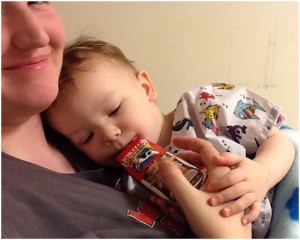
Once Sam’s teeth were fixed and the Prevacid was working, life got much better for all of us. Sam’s vomiting episodes were greatly reduced. We rarely even have weekly vomiting anymore. While he was and remains nervous about new foods, we hope to overcome that in time. He continues to eat well on the foods he is comfortable with and will occasionally accept new ones, though his reflux issues have left him with some apprehension about trying anything new. Coupling that with the usual toddler pickiness has proven quite the adventure to overcome for us parents! We still take care not to let him go long without a nutritious snack, which seems to also keep problems at bay.
At the time of this writing, Sam is 3 years old. He’s growing like a little weed and remaining right on his growth curve. We see no signs of stomach discomfort these days – he talks up a storm, plays like every other little boy, and is the picture of a happy, healthy toddler. He will tell us if something is bothering him and he does not say his tummy bothers him, which is a relief. He is still on the Prevacid. We have tried 3 times to wean him off, but the longest he has made it was 10 days. He will be on Prevacid long term it appears. This is not overly surprising, since there is a family history of reflux problems on my side (Ranitidine has always worked for me, but my siblings and father have had to go to PPI medications like our Sam, some long term and some short term).
I am hopeful that writing this will help parents know they are not alone. Reflux is not just spit up. It is unpleasant for all involved. It is isolating. You cannot go to a party, or a movie, or take the baby shopping because of the crying, the baby’s discomfort, and the too often unhelpful advice from the viewing gallery. Baby sitters are out as well, as nobody wants to watch a baby who is going to scream for hours on end – and you cannot trust a stranger not to take it out on the baby. Grandparents step in where they can, to offer support and respite, but it is emotionally and physically exhausting to deal with a reflux baby. Living with reflux is spending hours with both parent and baby crying, because nothing makes it better, and all you want is a comfortable baby and a couple hours sleep. It is exhausting for the entire family. I know because we’ve been there. I cannot offer many tips, other than research everything, keep your doctor informed, and make sure a good pediatric dentist is in your folder of medical consults. I can offer you hope though. You will get a handle on it at some point, just don’t give up!

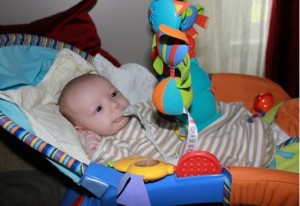



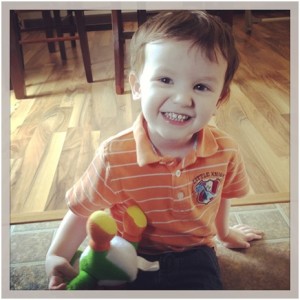

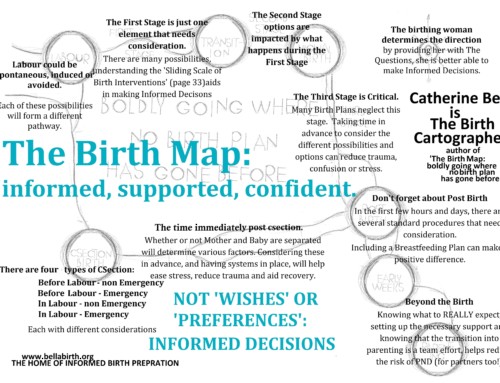

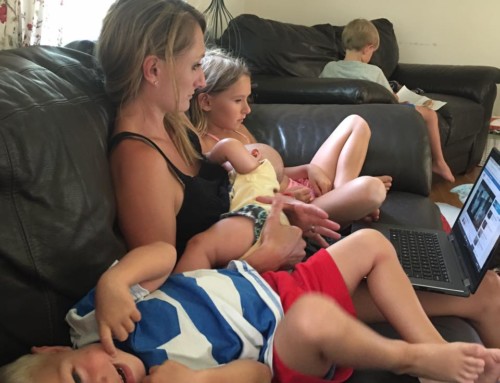

thanks for this post. We battled silent reflux with bub no 1 which is even harder to convince people about as there is no spit up! I was particularly frustrated as I have worked professionally with reflux in children so knew what I was seeing. It took us til my son was 4-5 months old before we finally managed to convince someone of the problem and get a referral to a paediatrician. Thankfully in australian many paediatricians are willing to prescribe PPI in children under 2 years and it certainly was a miracle drug from our point of view also! Our son was on the tablets until 16 months of age, I think I would have gone stir crazy without them. He is around the same age as your boy and is an excellent eater willing to try anything which I put down to the fact we were able to get his reflux under reasonable control from a (relatively) early age.
I find it massively frustrating that reflux is so poorly understood by health professionals working with mothers and children given that it is fairly common compared to other child health issues. It is also frustrating that there is no research on the effects of PPI on children under 2 years which is the main reason drs are unwilling to prescribe. I understand the issues with doing Randomised Control Trials in this situation but as I mused with a friend surely there are enough children out there who took PPI before two that we could do some post hoc analyses? Perhaps my stats knowledge is too rusty and I am missing something.
Again thanks for raising the profile of reflux in babies
My 4 week old has really bad silent reflux and alot of what you wrote about we are going through. My doctor recently prescribed Zantac but it has not helped yet at all. If you could do it all over again and give your baby Prevacid at a younger age would you have? I feel so bad for my little guy always gagging and choking I just want him to be comfortable and be able to sleep!
If we have another child and he has reflux, I’d try Zantac for 4 weeks… and if it didn’t help, then yes, I would push extremely hard to get liquid Prevacid. I would fight for it, because I know the difference it made and I *know* other children now who have gone on it in infancy. Zantac and Prevacid are different classes of reflux medications. Often if one class doesn’t work, the other class will do the trick. My husband agrees with me, we would not give Zantac as long as we did if this ever happened again and would not allow treatment to be delayed until he was 2. We would push further, though I would insist upon trying the medication before allowing an endoscopy, because the risks associated with it are riskier than trying the medication *in my opinion*. Always best to discuss everything very thoroughly with your doctors and push hard to make them understand the severity of life at home and the pain the child is in.
I know this is an older post but we are going through this right now with my 5 week old daughter. I think over supply is part of the issue, can you tell me how you worked with yours please?
There is some conflicting info on oversupply. See Dr. Jack Newman’s website for that perspective. I find his information quite helpful, though I’m conflicted on this issue.
I still think we had some oversupply going on (I could pump 3-4 ounces after he’d fully eaten sometimes, which is a lot for a pumping session with a full time nurser) and I really think we had the biggest problem with a forceful letdown, which kind of drowned the poor kid and caused him to gasp a lot of air, which was not helpful in keeping the milk down. Then with all the puking he was eating extremely frequently, which kept supply overly ramped up.
For us, what I did was I started “block feeding”. I fed my son fully on one side at a session and kept track by using a hair tie on my wrist on the side I needed to start from next meal. I’d latch him while leaning back a bit or feeding laying down. This let him dribble out the flow that was just too much. It left me with a soaked burp diaper, but I just learned to keep a burp diaper under us when he fed and waterproof pad under us if we were nursing in bed. He’d nurse for 15-20 minutes then on that side, fully emptying the breast. If he still seemed hungry, which wasn’t often, I’d offer the other side. He wouldn’t usually want it then, he was content, unless he lost the meal shortly after nursing. In that case he’d go ahead and want the other side, because he’d end up hungry again in short order.
I would suggest a consult on reflux with your pediatrician and/or a pediatric gastroenterologist, to make sure that the baby is not uncomfortable, is monitored for reflux, and has the option of medication if it is needed.
Your story hit home for me…my poor son suffered from silent reflux and the first six months of his little life were a nightmare. Feeling so helpless tore me up. Also, being ignored by doctors was a challenge. I want to ask you, though, have you heard of a tongue and/or lip tie causing reflux? The excessive swallowing of air (aerophagia) that occurs from the inability of the mouth to function properly can cause reflux/GERD. The ties also cause texture aversions, as well as tooth decay. There is a FB support group called “Tongue Tie Babies Support Group” that has excellent information and a provider list of medical professionals that can clip or laser the ties. My son’s tongue and lip ties were lasered in December and has helped his reflux tremendously! Here is a link that has great direction…http://www.mommypotamus.com/a-step-by-step-guide-to-diagnosing-tonguelip-ties/
There wasn’t as much online about tongue/lip ties 3 1/2 years ago, but thankfully there is more now. I actually already have the Mommypotumus page bookmarked in case of need in the future. It’s good info to have in the arsenal. Sam has already been through a full dental workup and she did check for ties I’m fairly sure, her lap-to-lap exam was very through before he went for surgery and at all follow ups 🙂
I just want to thank you for this post. No one seems to understand what we’ve been going through the past 20 months with our son. People act like vomiting all day is no biggie. Your post hits so close to home. All the doctors we’ve seen are not at all concerned about his vomiting because he’s never had any development or weight gain issues. We’re seeing a gastrointestinal specialist next month. We aren’t sure if he has reflux or allergies. Hopefully this doctor will have seen this before and know what course of action to take next. Your post has really helped me, I don’t feel so alone in our struggles now.
Hi. Our little guy is just about to turn 3 and had terrible reflux until 5 months of age when I found a wonderful homeopathic practitioner who cured him in 2 weeks. It seemed like a miracle as up until that point he nursed around the clock, was held upright for at least 20 minutes after every feeding and still woke up every time in a pool of vomit about 30 minutes after that. He now had a bunch of cavities despite a whole foods diet low in sugars and no juices. I am hoping that the damage to his teeth from the reflux is finished now but I wonder if bad mouth bacteria is linked to infant reflux.
what homeopathic medicine did you have success with?
Thank you for this post! I have been trying everything to help ease my sons discomfort. Nothing seems to completely work and I feel as if I’m going crazy half the time. He is so much better than he was but I can’t seem to get a handle on his spitting up and his mucusy poo’s. The drs say he doesn’t have herd because he is gaining weight nicely. But as parents we have been through the ringer trying to keep him healthy. We’ve been through the colicky weeks, oversupply, elimination diet, and so much more. He’s doing so much better, and the picture of your thriving beautiful boy is exactly what I needed. After a long night of anxiously searching the internet for answers, I finally feel at peace knowing that we will get through this, just like you did, and one day my son is going to be that thriving beautiful boy. Thank you!